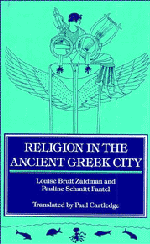Book contents
- Frontmatter
- Contents
- List of illustrations
- Author's preface to the English translation
- Translator's introduction
- List of sources
- PART I Introduction: How should we study Greek civic religion?
- 1 The necessity of cultural estrangement
- 2 Some fundamental notions
- 3 Sources of evidence
- PART II Cult-practices
- PART III Systems for representing the divine
- PART IV Envoi
- Appendixes
- Bibliography
- Index
3 - Sources of evidence
Published online by Cambridge University Press: 05 June 2012
- Frontmatter
- Contents
- List of illustrations
- Author's preface to the English translation
- Translator's introduction
- List of sources
- PART I Introduction: How should we study Greek civic religion?
- 1 The necessity of cultural estrangement
- 2 Some fundamental notions
- 3 Sources of evidence
- PART II Cult-practices
- PART III Systems for representing the divine
- PART IV Envoi
- Appendixes
- Bibliography
- Index
Summary
There are three kinds of original sources available to us for the study of Greek religion: literary texts, epigraphic documents and archaeological data.
LITERARY TEXTS
Ancient Greece had no great foundation text like the Bible, nor indeed any literature that was strictly speaking religious. Instead, the entire range of Greek literature provides us with every sort of information about religion. Rather than making a catalogue of this literature here, we shall simply cite certain works that have been especially drawn upon for the study of Greek religion.
Pride of place must go to Homer's Iliad and Odyssey. These vast epic poems, written down in the course of the eighth and seventh centuries, told the stories respectively of the Trojan War and of Odysseus' return from Troy to his native Ithaka. They constitute the earliest surviving written effort to reduce the domain of Greek religion to order, and they teem with detailed information on the pantheon, rituals and myths. Homer was ‘the poet’ for later Greeks, as Shakespeare is ‘the bard’, and his works were learned by heart as the basis of a Greek education. The vision of the world of the gods propagated in the Homeric poems formed the shared basis of knowledge for all Greeks at all periods.
Hesiod flourished in Boiotia around 700 or a little later. His two long surviving poems, the Theogony (‘Birth of the Gods’) and Works and Days, are indispensable sources.
- Type
- Chapter
- Information
- Religion in the Ancient Greek City , pp. 16 - 24Publisher: Cambridge University PressPrint publication year: 1992



